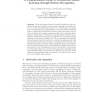188 search results - page 10 / 38 » Learning Obstacle Avoidance with an Operant Behavior Model |
ITS
2010
Springer
14 years 6 days ago
2010
Springer
Accelerated future learning, in which learning proceeds more effectively and more rapidly because of prior learning, is considered to be one of the most interesting measures of ro...
IJCAI
2003
13 years 8 months ago
2003
Refinement operators for theories avoid the problems related to the myopia of many relational learning algorithms based on the operators that refine single clauses. However, the n...
ICRA
2010
IEEE
13 years 6 months ago
2010
IEEE
Abstract— Autonomous robot navigation in unstructured outdoor environments is a challenging and largely unsolved area of active research. The navigation task requires identifying...
ER
2007
Springer
14 years 1 months ago
2007
Springer
An information system maintains a representation of the state of the domain in its Information Base (IB). The state of the IB changes due to the execution of the operations defined...
GECCO
2008
Springer
13 years 8 months ago
2008
Springer
We show how and why using genetic operators that are applied with probabilities that depend on the fitness rank of a genotype or phenotype offers a robust alternative to the Sim...

